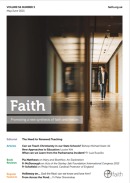Can we teach Christianity in our State Schools?
Bishop Michael Nazir-Ali makes the case for Christianity in the curriculum.
One of the features of our educational system is the near invisibility of Christianity in the syllabi of our State schools. Given its centrality in the recorded history of the nation and its role in the development of our laws, values and, indeed, the language itself, this is most remarkable.
Some attention is given to Europe’s classical heritage and this is understandable, but there is scarcely any mention of the fact that much of what is valuable in it - Greek Philosophy or Roman Law, for instance - was mediated through Christian redaction and use
- the ‘purified Hellenism’ of Pope Benedict. Nor do we hear about the evils of classical civilisation, such as cruelty for entertainment, female infanticide or slavery, which were eradicated largely because of Christian influence.
Cultural Marxism?
We could, of course, ask about the reasons for this neglect. Has it to do with the dominance of cultural Marxism, which seeks to undermine (for the sake of the ‘Revolution’) all ‘bourgeois’ social institutions, including the Church, in our higher educational and training institutions? Or has it to do with the increasing rejection of cultural norms like lifelong monogamy and family structures which are based on Christianity? Whatever the reasons, we may be reminded of GK Chesterton’s dictum that ‘Christianity has not been tried and found wanting. It has been found difficult and not tried’.
Great Issues
We should, of course, learn about the dark side of our history whether that is the exploitation of the poor in this country or slavery abroad. Why, though, can we not also teach what the historian William Lecky called ‘the perfectly virtuous pages of our history’ and the role of Christianity and of Christians in the promotion of Magna Carta, or the campaigns against the slave trade, or the amelioration of the working conditions of men, women and children, or, indeed, the introduction of universal education? Without engagement with the wide Christian tradition, how are pupils to engage with the great moral issues of our day, having to do with the integrity and protection of the person from the beginning to the end of life, respect for conscience, the equality of persons (though not necessarily every kind of lifestyle or behaviour), freedom of thought and expression? If all they imbibe is the nihilism of being random and meaningless products of a random and meaningless universe, how will this equip them to be responsible citizens, engaged parents and compassionate human beings?
Teachers
In short, we can say that awareness of the contribution of Christianity bears on almost every subject that is taught and is not limited to ‘God-slot’ subjects like Religious Education or Collective Worship in
schools. Coming to these, however, we can note that the recent report of the Commission on Religious Education sponsored by the Religious Education Council notes the sorry state of RE in
schools, with less than half of our schools being judged to be deliv- ering RE effectively. The reasons for this are various: teachers may not feel equipped to teach RE, there may be a dearth of suitable materials, it may be difficult to find a place in the timetable now that RE is not regarded as a ‘core’ subject, even if its teaching is compul- sory. It may also be that some heads and teachers are hostile to the teaching of religion, however objective and diverse such teaching is found to be.
Legal Requirements
It is worthwhile, therefore, to rehearse exactly what the legal requirements are for the teaching of RE and for Collective Worship in schools.
We need to go back to the 1944 Settlement, in which Archbishop William Temple played such a notable part. This provided for the teaching of RE based on Christianity, while not neglecting other religious traditions. The landmark Education Reform Act of 1988 recognised the continuing importance of the 1944 Settlement. It required that RE, in maintained schools that were not denominational, must ‘reflect that the Religious traditions in Great Britain are in the main Christian, while taking account of the teaching and practices of the other principal religions represented in Great Britain.’ Collective Worship, similarly, should be wholly or mainly of a broadly Christian character and is required daily. Allowance was made, however, for schools where the majority of pupils were from another religious tradition. These could seek a ‘determination’ which exempted them from the requirement that Collective Worship should be wholly or mainly Christian. Subsequent Education Acts have made similar requirements.
Duty
Where schools with a religious foundation are concerned, they are to provide for RE and Collective Worship in accordance with their trust deeds or the beliefs on which they have been founded. Denominational boards of education have the duty to ensure that RE and Collective Worship is being delivered in accordance with the Law and in consonance with the tenets of the denomination or faith concerned.
Non-religious schools must provide RE according to an agreed syllabus. Every such syllabus must reflect the fact that the religious traditions in Great Britain are in the main Christian, while taking account of other tradi- tions present here. Such syllabi are produced by Agreed Syllabus Conferences (ASCs), con- vened by local authorities for schools in their area. The ASC’s are structured in such a way as to give all stakeholders a voice in the agree- ing of a syllabus, but Christian churches have a presence which can prevent the agreeing of a syllabus which does not provide for sufficient teaching of Christianity. In addition to these ASCs, there are also the Standing Advisory Councils on RE (or SACRE’s) whose task is to advise and support local author- ities and schools in delivering on their stat- uary obligations regarding RE and Collec- tive Worship. It is open for Christians to get involved locally in one or other (or both!) of these bodies and thus play a part in shaping the direction and implementation of RE and Collective Worship in their area.
It is true that the Academies and Free Schools established by the Coalition Gov- ernment are not bound by the ASCs and the SACREs. However, some of them do follow their advice, because they are required to deliver on RE and Collective Worship like other schools.
Dire Straits
Given such a strong statutory and advisory framework, why are RE and Collective Worship in such dire straits in many schools and what can be done to address this critical situation?
The recommendation of the Commission on Religious Education that adequate time and resources should be provided for the initial training of teachers and also for continuing professional development is well taken and parents, churches and other bodies should press the Department of Education to make such provision without delay.
Some other recommendations of the report, however, need to be considered more carefully. For instance, the suggested change from RE to ‘Religion and Worldviews’ would detract from the study of concrete religious traditions, their devotional practices, values and moral attitudes and concentrate too much on philosophical discussion about the nature of belief, religious or non-religious language and its function etc. In an age where, in most parts of the world, religion is of increasing significance, this would be disastrous in equipping pupils to engage with actual situations in which they may find themselves.
The recommendation, similarly, that the setting of the syllabus should be done centrally would deprive local religious communities of meaningful participation in deciding the contents and balance of what children, in a given area, should be taught. This will negate the good practice of involving local communities in course development and delivery which has developed over many years. The role of the ASCs and SACRE’s should rather be developed within a common framework which allows for local variation, as circumstances require.
Religious Belief and Practice
Non-religious worldviews are, no doubt, worthy of study but this should not be confused with RE. Religious belief and practice is not just about ideas but about worship, ritual, celebration, mourning, relationshipsand much else besides. It may be that non-religious worldviews can be taught in the context of the history of ideas or of political, scientific and moral thought but their association with religion will further dilute the teaching of religious traditions which are in the main Christian, as well as of other traditions which pupils will need to know, if they are to be good global citizens. If this recommendation is also enforced on faith-based schools, it will have the effect of watering down their teaching of RE in accordance with the tenets of belief on which a particular school is founded.
In addition to their involvement in ASCs and SACRE’s, churches and their boards of education should be actively engaged in producing resources not only for schools affiliated to them but for the whole sector. An example of this is the Church of England’s resource Understanding Christianity which aims to support pupils in developing their understanding of the Christian Faith. Although produced by one denomination, it has been developed in such a way that it can be used in all schools. The Anglican Oxford Schools Chaplaincy produces resources, developed alongside teachers, to assist in understanding the significance of various festivals and how they are celebrated. The ecumenical Schools Bible Project helps pupils study the life and message of Christ in the New Testament. Students Exploring Marriage helps older pupils with thinking about stable and life-giving relationships and respecting the dignity of those with whom they form a relationship.
Worship
Schools sometimes lack resources and willing hands to lead a daily act of worship, as the law requires. This is where offers of help from churches and organisations can be accepted with alacrity! Clergy and other church workers are often welcomed into non-religious schools not only to help with worship but to lead discussion groups on important issues of the day such as mental and spiritual well-being, ethics at the workplace, fidelity in relationships and the sanctity of persons. Churches should be prepared to take these opportunities when they arise, indeed, to actively seek for them. It is good also to invite pupils and teachers into church buildings, especially at times of festivals, anniversaries and rites of passage. Crossing that all important threshold into a church building and getting used to its arrangements during school days will stand pupils in good stead later in life. It should be remembered that an act of worship in such schools has to be of a wholly or broadly Christian character but it also has to be non-denominational. Where there are significant numbers of pupils belonging to other faiths, there will have to be sensitivity without compromising the essentials of the faith.
Resistance and obstacles
Although there is resistance and there are obstacles, there are many opportunities still available for a meaningful Christian contribution to the spiritual and moral life of our schools. They should be seized with both hands. It is important to discuss the Christian influence in our history and in the development of subjects like the arts, archaeology, law, literature and even in a scientific mindset. Concerned Christian organisations could conduct a review of the syllabi to identify where such influence has occurred and whether it is being sufficiently recognised. On the basis of such a review, there can then be representations to the Department of Education and campaigning by parents, teachers and educationalists for the Christian contribution to be duly recognised.
I chair a representative and inter-denominational coalition of those involved in education. If anyone wants to be in touch with any of these organisations, please contact me via the Oxford Centre for Training, Research, Advoca- cy and Dialogue: website michaelnazirali.com
Bishop Michael Nazir-Ali is Anglican Bishop Emeritus of Rochester






